The Telegraph has published a column by retired British Army colonel Richard Kemp, who compares Putin to Hitler and predicts his defeat. Putin himself likes to recall the Second World War and draw parallels with his "denazification". Kemp considers it appropriate to compare Putin himself with Hitler, whom he calls an effective political strategist and an incompetent commander-in-chief. Like Hitler, as the situation on the battlefield worsens, Putin increasingly takes direct command of the troops. For example, he ordered to continue the offensive on Bakhmut with the hope of at least some success instead of strengthening the defense in the places of the Ukrainian counteroffensive. After every major failure, Putin fires the generals and replaces them with sycophants, just like the Nazi dictator did. The main forces of the Russian army are currently concentrated in the Kherson direction, but if Ukraine manages to continue the counteroffensive there as well, there are high chances that Putinʼs "bunker mentality" will only intensify, the colonel believes. Accordingly, the number of mistakes both on the battlefield and in domestic politics will increase. Despite this, the Russian leader remains a dangerous enemy who does not stop bombing Ukrainian cities, or may use nuclear and chemical weapons. In response, it remains only to continue threats and be ready to show Russia the consequences of these decisions.
Russian oppositionist Mikhail Khodorkovskiy writes about the near end of Putin in a column on Politico. Until now, Russian society passively supported the war in Ukraine, because the authorities did not demand anything from the people. After the announcement of mobilization, the situation will gradually change, Khodorkovsky believes. In the past, the authorities managed to compensate for the recruitment of conscripts with generous posthumous payments, and for the poorest population of the periphery this seemed a fair exchange. But the stocks of "cannon fodder" began to run out, and the Kremlin may face at least mass evasion of the draft. At the same time, Khodorkovsky believes, losses and desertions will increase, and protests will begin to take on more aggressive forms. There will be more and more disgruntled armed men in the country, including from the "annexed" territories. Right now, the moment has come when the West should forget about reconciliation with Putin, instead increasing its support for Ukraine even more.
James Stavridis, former commander in chief of NATO forces in Europe, writes in Bloomberg about Putinʼs attempts to keep Serbia and Bosnia in his sphere of influence against the background of the war. Despite the failure in Ukraine, Putin continues his destructive activities in other regions, writes Stavridis. Russia supports far-right movements and spreads propaganda in Europe to harm democratic regimes. The Kremlin is particularly successful in the Balkans, promoting the narrative of NATOʼs hostility towards the Slavs. At the center of these efforts is Serbia, which, on the one hand, was able to build relations with the West, and at the same time is significantly influenced by Russia. Stavridis believes that Putinʼs main goal is to keep Serbia and Bosnia from joining NATO and the EU, and he is also trying to "distract" the West with the tension between Serbia and Kosovo. To counter these efforts, in addition to maintaining a peacekeeping garrison, the West must focus on regional economic leverage and information warfare. Economically, Russia has few advantages here, the column says, but it is still winning in the information war. It is important for the West not to forget about the Balkans, because Russia will continue to try to create a gap between the region and the rest of the developed world.
